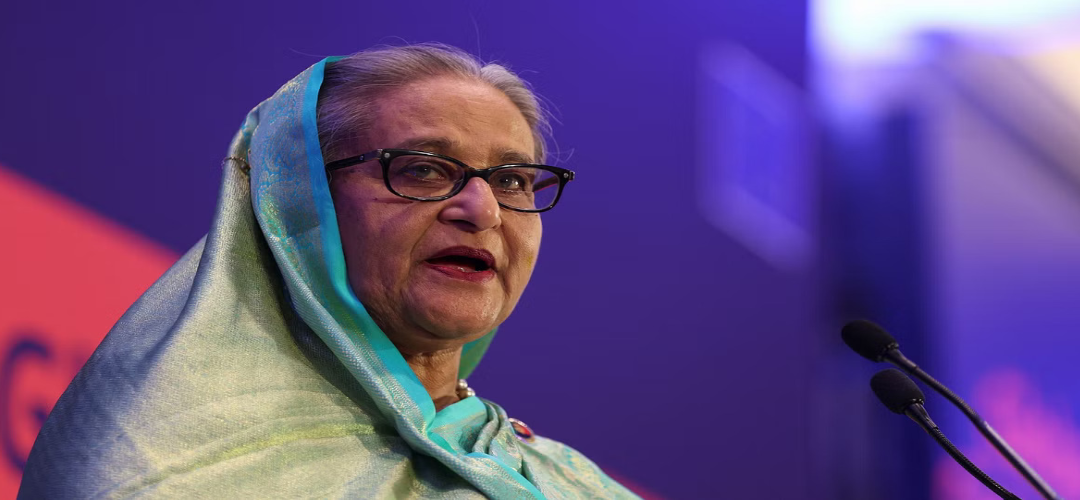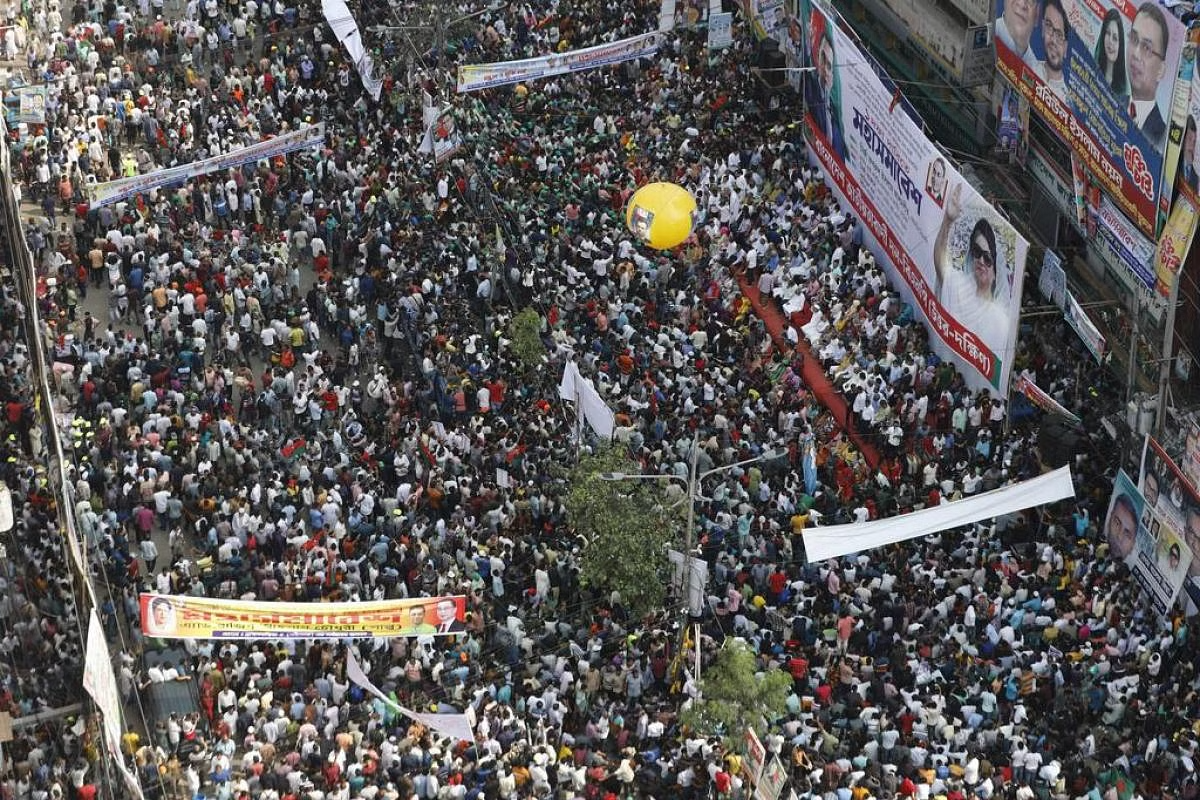Trouble in ‘Sonar Bangla’
November 4, 2023 | Expert Insights

With elections just a couple of months away, Bangladesh is undergoing huge upheavals in the political arena.
A desperate opposition, out of power since 2009, is fighting tooth and nail to claw its way back into the contention. And an equally combative and politically hardened, the ruling Awami League under Mrs Sheikh Hasina is in no mood to relent. All in all, the stage is set for the most contentious election ever, even by Bangladesh standards, with international watchers predicting bloodshed and rigging.
Since December 2022, political tensions have been rising in Bangladesh. On October 28, 2023, things came to a head. The Bangladesh police have been accused of using unnecessary force on the opposition parties. The main opposition leader, Mirza Fakhrul Islam Alamgir, has been detained for questioning. The opposition has called for a complete boycott of the government. The country is currently on a precipice.
New Delhi, consistent in its unambiguous support for the Sheikh Hasina government, would be watching the developments with concern, especially after the pro-India government in the Maldives was voted out of power.
Background
The Awami League under Sheikh Hasina has been in power in Bangladesh since 2009. With the incumbency factor always playing a pivotal role in South Asian politics, this would be the longest, unbroken period for any political party to remain in power. To quote a cliché attributed to the British Lord Action, 'Power tends to corrupt; absolute power corrupts absolutely,' critics of the Awami League feel it is time for the party to take a bow. Even more worrying are accusations, duly supported by neutral observers like Amnesty International, that opposition leaders are being arrested and their supporters harassed/ beaten by state agencies.
Out of all of India's neighbours, Bangladesh holds a special position for obvious reasons: Indian military power allied with the Mukti Bahini achieved a remarkable victory in giving birth to a new nation within a short campaign of two weeks.
Things, however, were not so simple for the newly emerged state of Bangladesh. While it was grateful to the Indian government for helping it fight for independence, this would never be enough in the long run. From the very beginning, Bangladesh has been stuck in an identity crisis. One part of the country is pro-India. This is the Awami League launched by the founder of the country, Sheikh Mujibur Rehman and now led by his daughter. The other side of the country is anti-India in nature. This is represented by the Bangladesh Nationalist Party (BNP) led by Khaleda Zia, the widow of the former dictator of Bangladesh, Ziaur Rehman.
The support to and from India swings depending upon which party is in power.
The electoral campaigning for the 2024 elections has been especially chaotic and violent. For months, tensions have been on the rise as isolated acts of violence being perpetrated by both sides add up to create a deep chasm of hatred and distrust that threaten to divide the polity into two camps.
The BNP, which had boycotted the 2014 elections, has threatened to do so again as it does not trust the fairness of the elections as long as Sheikh Hasina remains the prime minister. They are demanding a caretaker government to conduct the elections as is the norm in Pakistan, where such a caretaker government, propped up by the Army, has been ruling since August. This requirement was removed in Bangladesh by the Parliament in 2011. Sheikh Hasina has refused to quit till the elections are over.
The BNP is clearly in a fighting mood and is the main driving force behind mass protests demanding Sheikh Hasina remit office. Tens of thousands of protestors congregated in Dhaka in anti-government protests. The government reacted violently, and several deaths have occurred from police firing.

Analysis
The current political unrest in Bangladesh is not occurring in a vacuum. It is not as simple as an autocratic government suppressing a democratic opposition being portrayed by the supporters of the BNP. The issue goes much deeper.
For one, the Indian shadow looms larger over the domestic political scene in Bangladesh. This claim of a perceived or actual 'Indian hand' comes to the fore, especially at election times. No doubt, Indo-Bangladesh relations have reached a new height during the rule of the Sheikh Hasina government, a fact that many regional actors are wary of. New Delhi has made a serious and genuine effort to meet the historic grievances of Dhaka, and the results have been mutually beneficial; New Delhi has emerged as a significant development partner. India has benefited from a much-pacified eastern frontier that has allowed it to focus on developing its Northeast, including seeking transit rights to these states through Bangladeshi territory, reducing the time and cost of the journey drastically.
This has not been liked by the revisionist forces within Bangladesh that have still not forgiven India for breaking up Pakistan’s eastern half from the western portion. Of course, there is tremendous support for these elements from Islamabad and its ISI, which is very active in the country. It is common knowledge that to mobilise 'street power', considerable financial expenditure is involved, which is clearly visible in the rising tide of street protests.
Sheikh Hasina’s government has cracked down hard on Islamists within Bangladesh. This has not been easy. It has been a cathartic process for Dhaka. The Bangladeshi Islamists have a history of turning against any democratically elected government to pursue their own radical agendas that have support from Pakistan. Under the Awami League, considerable progress has been made in curbing the activities of such radical elements, including the relentless prosecution of war criminals who collaborated with the Pakistan Army in committing war crimes in 1970-71 during Operation SEARCHLIGHT. After coming to power in 2009, the first act of the Sheikh Hasina government was to set up a war crimes tribunal. This tribunal galvanised the Islamist opposition in Bangladesh. It hit back through terror acts.
However, in retrospect, it may be possible that the Awami League government may have gone overboard in its response. Internationally, it has been alleged that there has been a clampdown on free speech in Bangladesh, with journalists especially being singled out for attacks and arrests under the draconian Digital Security Act. Also, arbitrary arrests and detentions of political workers have increased at an alarming rate. This democratic backsliding is not good news for Bangladesh. The opposition parties do not trust the government to carry out free and fair elections. They have called for a caretaker government to carry out this role. The ruling administration of the Awami League has rejected this proposal.
The West, led by the U.S. has been quick to point out the increasing state perpetrated violence and arrests against the opposition. China, a key trade partner of Bangladesh, has maintained its reserve, neither criticising nor supporting the Awami League government.
India is in a tricky situation. New Delhi obviously has an interest in the continuation of the rule of Sheikh Hasina’s government. But how this rule is maintained is also important. A democratic Bangladesh is the best answer. This might give the pro-Pakistani forces a temporary advantage in the country. However, the reputation and credibility of Sheikh Hasina will be maintained. She will live to fight another day. The Indian government must nudge the Bangladeshi government in this direction without rocking the boat so that the hope that was sparked in 1971 lives on in the future.
The worsening economic condition is not helping matters either, with Dhaka forced to seek IMF loans early this year. The public at large is facing escalating inflation (9.6 per cent in September) and dwindling foreign reserves as the global market for Bangladesh exports shrinks due to the Ukraine war and now the Gaza crisis. Economic uncertainty is a recipe for political unrest.
Assessment
- Bangladesh is in a delicate situation. Its democratic credentials are at stake, which must not be surrendered to the expediency of getting a favourable dispensation elected to power. For democracy to survive and thrive, free and fair elections must be ensured, even if neutral foreign observers from the EU and other democratic nations are pressed into service. India must support this wholeheartedly.
- Political reconciliation is still not achieved in Bangladesh as the wounds of the war of liberation continue to fester. It is about time the nation created a credible peace and reconciliation forum to put to rest the ghosts of 1971 and reconcile those who support a moderately Muslim nation nurturing its Bangla culture and language and the more radical Islamists who look towards a Sharia rule.








Comments